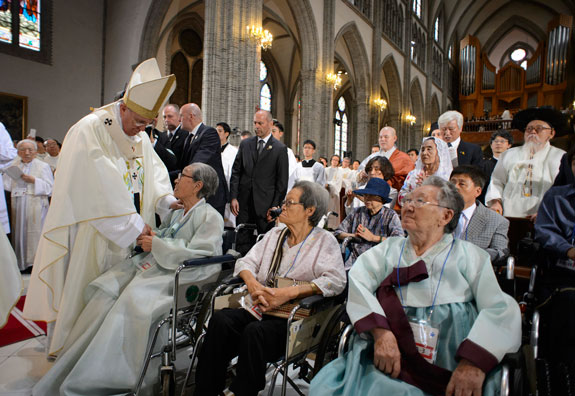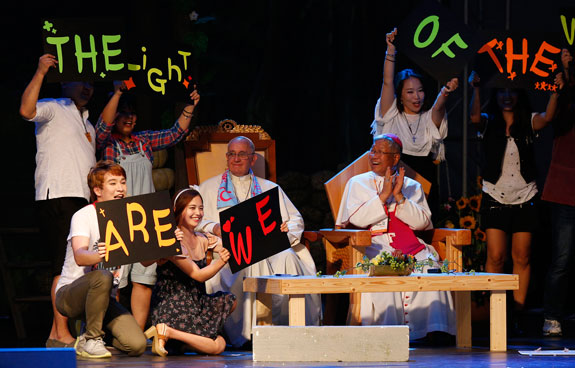by Francis X. Rocca and Simone Orendain

SEOUL, South Korea (CNS) – Pope Francis told Korean Catholics that the reunification of their divided peninsula as well as the harmony of South Korean society depend on the practice of Gospel virtues, especially charity and forgiveness.
God’s promise to restore unity and prosperity to “a people dispersed by disaster and division … is inseparably tied to a command: the command to return to God and wholeheartedly obey his law,” Pope Francis said.
In a homily Aug. 18, during a Mass for peace and reconciliation at Seoul’s Myongdong Cathedral, Pope Francis said Jesus asked people “to believe that forgiveness is the door which leads to reconciliation.”
In attendance at the Mass, which was closed to the public, were South Korean President Park Geun-hye, former World War II sex slaves, North Korean defectors and 12 clerics from various faiths.
“I ask you to bear convincing witness to Christ’s message of forgiveness in your homes, in your communities and at every level of national life,” he said.
Dialogue and Openness
On the previous day, Pope Francis urged Catholic bishops and young laypeople from across Asia to evangelize their continent through dialogue and openness, even with others suspicious or intolerant of the Church. But he also urged them to challenge aspects of their cultures incompatible with Christian values.
The pope spoke Aug. 17 at Haemi Castle, about 60 miles south of Seoul, where thousands of Catholics were imprisoned and tortured during the 19th century, and at a nearby shrine commemorating those killed. It was the last full day of his visit to Korea, the first of his pontificate to Asia.
“On this vast continent which is home to a great variety of cultures, the church is called to be versatile and creative in her witness to the Gospel through dialogue and openness to all,” Pope Francis told several hundred Asian bishops, leaders of the church in a region that is only 3 percent Catholic.
“I earnestly hope that those countries of your continent with whom the Holy See does not yet enjoy a full relationship may not hesitate to further a dialogue for the benefit of all,” he said.
His statement was an overture to China, which has not had formal relations with the Vatican since after the country’s 1949 communist revolution.
Jesuit Father Federico Lombardi, the Vatican spokesman, later noted that the Vatican does not have diplomatic relations with several Asian countries, including North Korea, Vietnam, Myanmar, Laos, Brunei and Bhutan.
Pope Francis told Asian bishops that dialogue required “empathy and sincere receptivity,” but also, as a “fundamental point of reference,” a clear sense of “our identity as Christians.”
“If we are to speak freely, openly and fruitfully with others, we must be clear about who we are, what God has done for us, and what it is that he asks of us,” he said.
Korean Martyrs
During his visit, Pope Francis placed 124 Korean martyrs on the last step toward sainthood in a beatification Mass that brought elation to the 800,000 people in attendance.
The pope pronounced the formula of beatification at the request of Bishop Francis Ahn Myong-ok of Masan, president of the commission for the beatification.
With his words, trumpets blared and a huge swath depicting a watercolor of the newly blessed martyrs in heaven was unfurled on the side of a large building facing the square where the faithful cheered.
“It was very great to see Papa Francis,” Sophia Moon, 26, told Catholic News Service (CNS). “He was very touching to us because in Korea there have been very hard times and there were (people who became martyrs).”
The 124 were killed for their beliefs, setting off a 100-year period in the 18th and 19th centuries when the Korean government went after about 10,000 faithful who pledged filial piety to God, not the king of Joseon. Among this group was Paul Yun Ji-Chung, the first Korean executed for his faith because he buried his mother using Catholic rites.
In his homily, the pope said: “So often we today can find our faith challenged by the world, and in countless ways we are asked to compromise our faith, to water down the radical demands of the Gospel and to conform to the spirit of this age.”
“Yet the martyrs call out to us to put Christ first and to see all else in this world in relation to him and his eternal kingdom. They challenge us to think about what, if anything, we ourselves would be willing to die for,” he said.
Witness to Christ
Pope Francis also made an impact on Asian youth by being the first pope to attend Asian Youth Day.
During his homily on the grounds of Haemi Fortress, Pope Francis urged more than 40,000 people – including young Catholic leaders from 22 Asian countries – to “reflect God’s love.” He reminded them it was their “right and duty to take part in the life of (their) societies.”
He also urged them to discern “what is incompatible with your Catholic faith … and what aspects of contemporary culture are sinful, corrupt and lead to death.”
Young people are always choosing their social lives over other things, and this makes it complicated to “grow up in their faith also,” said Montira Hokjareon, a youth coordinator in Thailand’s Udon Thani Diocese. She said it is hard for young Thai Catholics to practice their faith in a predominantly Buddhist country where less than half of 1 percent of the population is Catholic.
Hokjaroen, 34, was one of 20 participants who had lunch with Pope Francis Aug. 15. She told CNS it was good he nudged youth leaders to evangelize, “because I think the people will learn (about) Jesus through us.”
At the event’s closing Mass, Pope Francis emphasized this year’s theme: “Asian Youth Wake Up, the Glory of the Martyrs Shines on You.”
He told youth to build “a church which loves and worships God by seeking to serve the poor, the lonely, the infirm and the marginalized.”
Michael Hwang, 17, of Seoul said he was glad to be a part of Asian Youth Day because it brought him closer to other Catholics from Asia.
“[The pope] said to wake up and a lot of people can come together, and we could be like one nation,” he said.
Hwang said his friends are not Catholic, “but I think Catholicism is a great thing and I can tell to my friends about how (being) Catholic is great, and this event will be a great background to teach or tell other people.”

